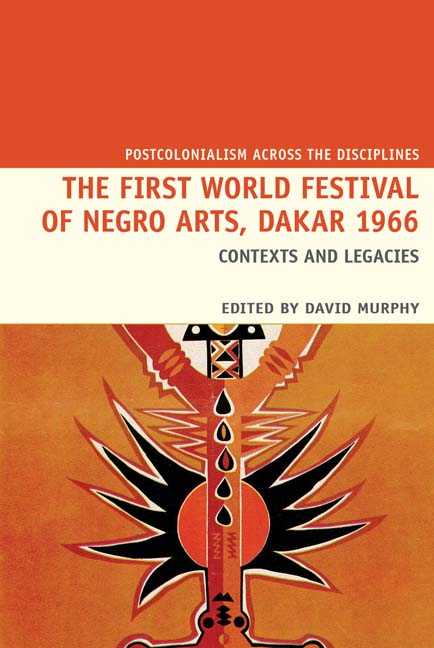Book contents
- Frontmatter
- Contents
- Acknowledgements
- List of Figures
- Notes on Contributors
- Introduction. The Performance of Pan-Africanism: Staging the African Renaissance at the First World Festival of Negro Arts
- I Contexts
- II Legacies
- 6 ‘Negritude is Dead’: Performing the African Revolution at the First Pan-African Cultural Festival (Algiers, 1969)
- 7 Beyond Negritude: Black Cultural Citizenship and the Arab Question in FESTAC ‘77
- 8 Cultural Festivals in Senegal: Archives of Tradition, Mediations of Modernity
- 9 FESMAN at 50: Pan-Africanism, Visual Modernism and the Archive of the Global Contemporary
- 10 PANAFEST: A Festival Complex Revisited
- Books and Films about the 1966 Festival
- Bibliography
- Index
6 - ‘Negritude is Dead’: Performing the African Revolution at the First Pan-African Cultural Festival (Algiers, 1969)
from II - Legacies
- Frontmatter
- Contents
- Acknowledgements
- List of Figures
- Notes on Contributors
- Introduction. The Performance of Pan-Africanism: Staging the African Renaissance at the First World Festival of Negro Arts
- I Contexts
- II Legacies
- 6 ‘Negritude is Dead’: Performing the African Revolution at the First Pan-African Cultural Festival (Algiers, 1969)
- 7 Beyond Negritude: Black Cultural Citizenship and the Arab Question in FESTAC ‘77
- 8 Cultural Festivals in Senegal: Archives of Tradition, Mediations of Modernity
- 9 FESMAN at 50: Pan-Africanism, Visual Modernism and the Archive of the Global Contemporary
- 10 PANAFEST: A Festival Complex Revisited
- Books and Films about the 1966 Festival
- Bibliography
- Index
Summary
Over the course of 12 days in the summer of 1969, African revolutionaries converged on the city of Algiers for the First Pan-African Cultural Festival (Festival panafricain d'Alger or PANAF). PANAF provided a forum for newly independent African nations, as well as the movements still struggling for liberation, to articulate their anti-imperialist vision. In particular, the festival's participants emphasized the central and multiple roles that African culture would play in the formation of the new, postcolonial world. Attendees sought to enact this revolutionary reality through popular artistic performances on the streets of Algiers and in an elite intellectuals’ symposium.
In emphasizing the revolutionary potential of African culture, many participants in the Algiers festival challenged the famous ideology of Negritude, especially as championed by Léopold Sédar Senghor of Senegal. Negritude, long a dominant stream in pan-African thought, held that black Africans could use indigenous cultural forms to foster modern identities free from European racist and colonial models. Senghor, a poet and the president of Senegal from independence in 1960 until 1980, had celebrated Negritude's role in independent Africa three years prior to the Algiers festival. At the First World Festival of Negro Arts (Premier Festival mondial des arts nègres), held in the Senegalese capital of Dakar in 1966, Senghor and his peers had sought to demonstrate the power of Negritude through various forms of artistic and cultural expression. In the following years, facing criticism from other African intellectuals over the limits of their ideological framework, Senghor and others had by the late 1960s sought to expand the concept of Negritude to the larger-scale level of ‘Africanity’, or africanité. This question of what constituted such a continental cultural identity would prove central to discussions during the Algiers festival.
The Pan-African Cultural Festival of 1969 served as a platform for Africa's cultural and political leaders to debate the major currents in Africanist thought and to put them into practice in cultural performances. As the records of the symposium make clear, by that time Negritude had lost its power as a guiding ideology. Some of its critics went so far as to declare it ‘dead’. In its stead, the festival's participants, especially those from Francophone countries, articulated a new vision of Africanity as radical cultural practice rooted in Frantz Fanon's interpretation of the role of African intellectuals and artists in the anti-colonial struggle.
- Type
- Chapter
- Information
- The First World Festival of Negro Arts, Dakar 1966Contexts and legacies, pp. 143 - 160Publisher: Liverpool University PressPrint publication year: 2016



